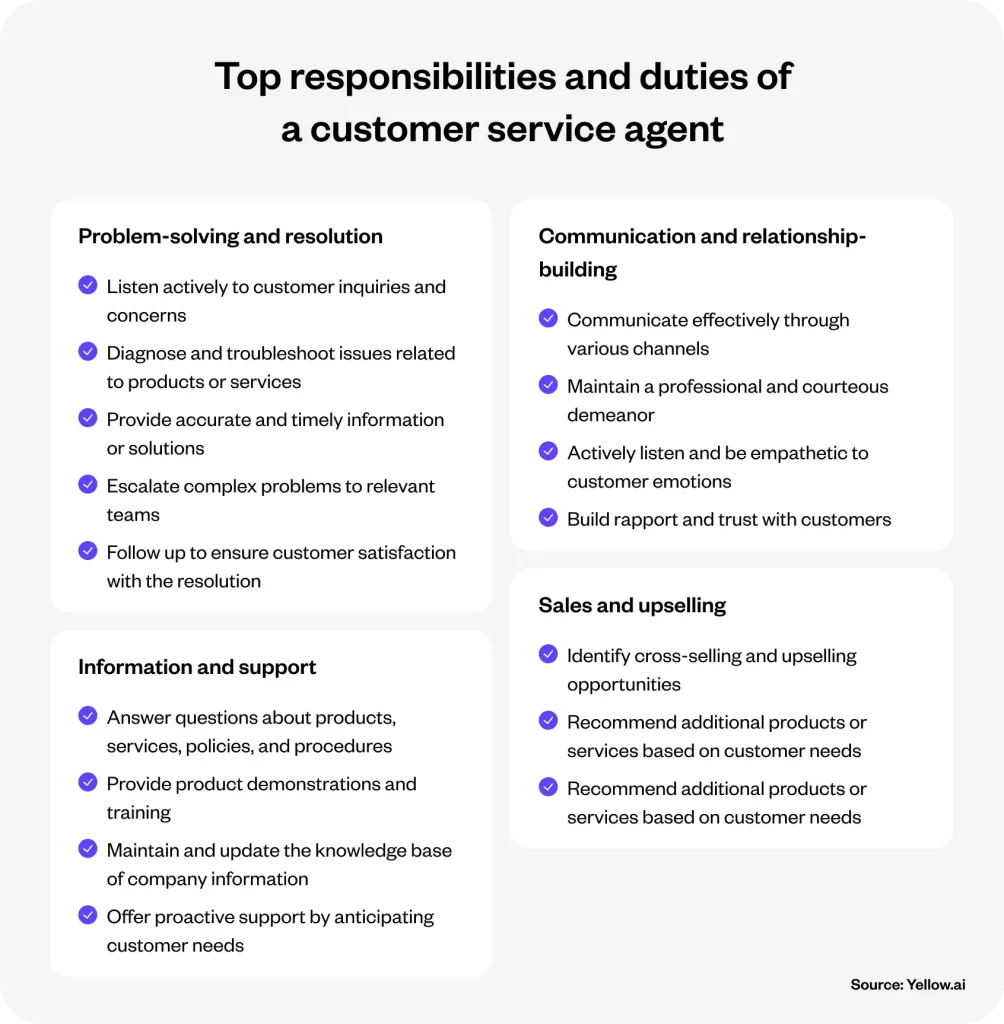Customer service responsibilities begin at the very first hello and continue through to the final word of feedback, encompassing every aspect of the customer journey. A customer service representative must be fully versed in these duties, comprehending the breadth of their impact. Doing so cultivates an exceptional service experience that not only satisfies but delights the customer.
This exceptional experience serves as a magnet, drawing customers closer to the brand. A Salesforce survey underscores this, revealing that 91% of customers are more inclined to repurchase following a stellar service encounter.
In this blog, we delve into the bedrock of customer service and the pivotal role played by customer support agents in fostering positive interactions. We dissect the fundamental responsibilities—from adept problem-solving and seamless communication to forging strong relationships—that epitomize superior customer service. Moreover, we spotlight the importance of informational support and savvy sales strategies. Grasping these critical areas allows businesses to fortify customer bonds, boost loyalty, and accelerate growth. Embark with us as we demonstrate how mastering customer service responsibilities empowers support teams and elevates the customer experience, setting the stage for enduring success.
Related must-reads:
- A comprehensive guide to automating customer service
- Customer service software: How to select the best one
- Good customer service: Ways to deliver [+10 Examples]
- 10 Ways to improve customer service in banking
What is customer service?
Providing support to customers throughout their entire purchasing process is known as customer service. It encompasses all stages, including before and after the sale, and serves as a vital connection between customers and businesses. By ensuring a smooth and seamless experience, effective communication and meaningful connections are created, making customer service more than just a service – it’s an experience. This experience is crucial in building customer loyalty and satisfaction.
In today’s fast-paced and highly competitive market, exceptional customer service significantly relies on a brand’s capability to align with customer anticipations by:
- Holistic and proactive support: It covers every aspect of the customer’s experience, ensuring guidance and assistance are available at every point of their journey.
- Beyond transactions: Customer service transcends mere transactions, aiming to create a lasting impression and a strong relationship between the customer and the brand.
- Digital evolution: The digital age has transformed customer service, expanding it beyond traditional in-person or telephone interactions to include various channels and platforms.
- Adaptability and responsiveness: Reflecting changes in consumer behavior and preferences, modern customer service requires businesses to be more flexible and quick in their responses, ensuring they can meet customers’ needs promptly and efficiently.
Top responsibilities and duties of a customer service agent
Customer service agents are the frontline warriors of any business, ensuring customer satisfaction and loyalty. Their roles and responsibilities are diverse, yet each is crucial for delivering exceptional customer service. Here are the top responsibilities of a customer service agent:

Problem-solving and resolution
1. Listen actively to customer inquiries and concerns
The foundation of effective problem-solving in customer service lies in active listening. This means paying full attention to the customer’s words, understanding the context of their problem, and empathizing with their situation. Active listening involves:
- Acknowledging the issue: Letting customers know their problem is understood and taken seriously.
- Clarifying details: Asking questions to get a clear picture of the issue, ensuring no critical details are missed.
- Empathy and reassurance: Show empathy towards the customer’s situation and reassure them that they are working towards a solution.
Active listening is about hearing the customer’s words and understanding the emotions and intentions behind them. By doing so, customer service agents can diagnose problems more accurately and provide solutions that genuinely address the customer’s needs.
How can AI help do this better
Yellow.ai’s dynamic AI agents (AI-powered chat or voice bots) can automatically capture and categorize customer inquiries, ensuring no detail is missed. By using natural language processing (NLP), the AI can understand the context and emotions behind the customer’s words, allowing for more accurate and empathetic responses.
Example: An e-commerce company uses AI chatbots to understand and categorize customer complaints about delayed deliveries, providing personalized responses and escalating more severe cases to human agents.
2. Diagnose and troubleshoot issues related to products or services
Diagnosing and troubleshooting issues is a pivotal duty for agents, particularly in the tech and SaaS sectors. This responsibility goes beyond mere interaction; it demands a blend of technical knowledge, analytical thinking, and customer empathy, ensuring that every customer leaves the conversation feeling valued and understood.
- Deep product knowledge: Agents must thoroughly understand their products or services to identify and resolve issues quickly.
- Team collaboration: Effective troubleshooting often requires teamwork, with agents and development teams working together to address and prevent recurring problems, improving the product experience.
- Customer satisfaction focus: The goal is to resolve issues to ensure customer satisfaction and loyalty, emphasizing long-term solutions that prevent future problems.
Mastering the art of diagnosing and troubleshooting is essential for customer service agents, as it directly impacts customer satisfaction and product quality. By effectively addressing customer issues, agents solve immediate problems and contribute to the ongoing improvement of their products and services.
How can AI help do this better
Yellow.ai offers AI-driven diagnostics tools that can quickly identify common issues based on customer descriptions and historical data. It provides step-by-step troubleshooting guides and can escalate unresolved issues to human agents with detailed context.
Example: A tech company leverages AI-powered automation to help users diagnose software bugs reported by users, automatically providing potential fixes or escalating complex issues to the development team.
3. Provide accurate and timely information or solutions
A cornerstone of effective customer service is providing accurate and timely information or solutions. This responsibility is paramount for customer service agents, ensuring that every interaction is informative and efficient.
- Accuracy in information: Agents must ensure that all information shared with customers is correct, up-to-date, and relevant to their queries or issues.
- Prompt response: Time is of the essence in customer service. Quick yet accurate answers are crucial in maintaining customer trust and satisfaction.
- Solution-oriented approach: Beyond providing information, agents offer solutions that address the customer’s underlying needs or problems effectively.
Delivering accurate and timely solutions is not just about answering questions; it’s about enhancing the customer experience and building lasting trust. Customer service agents play a vital role in achieving this, directly influencing customer perceptions and loyalty through their responsiveness and reliability.
How can AI help do this better
Yellow.ai’s AI offers 100+ pre-built integrations which ensures all information on customer accounts are up-to-date by integrating seamlessly with internal knowledge bases and CRMs. The AI can respond instantly to customer queries, reducing wait times and improving satisfaction.
Example: A utilities company uses Yellow.ai’s voicebots to provide immediate, accurate answers to billing inquiries, refill requests, delivery tracking and more thereby significantly reducing the volume of calls to human agents.
4. Escalate complex problems to relevant teams
In customer service, recognising when a problem exceeds the scope of immediate resolution is crucial. Agents must know how to escalate complex issues to the appropriate internal teams, ensuring that every customer concern is addressed with the highest level of expertise.
- Identifying complex issues: Agents are trained to identify problems requiring specialized attention when a case is too technical or intricate for standard solutions.
- Effective communication: Once a complex issue is identified, the agent must clearly and accurately communicate the problem to the relevant internal teams, outlining the customer’s concerns and the situation’s urgency.
- Ensuring follow-up: After escalation, the agent’s role includes monitoring the issue’s progress and ensuring that it is resolved satisfactorily, maintaining open lines of communication with the customer throughout the process.
Escalating complex issues to the right teams is not merely a procedural step; it’s a comprehensive customer service strategy that builds trust and underscores a company’s commitment to resolving every customer issue, no matter its complexity.
How can AI help do this better
Yellow.ai’s dynamic AI agents can identify when an issue requires human intervention and automatically transfer it to a live agent with a detailed log of the customer’s problem and previous interactions. Additionally, agent assist features provide real-time insights and suggestions to human agents during the interaction, ensuring a smooth handoff and faster resolution.
Example: A financial institution uses Yellow.ai’s omnichannel AI agents to escalate complex fraud cases to a specialized team, providing all relevant details and customer history for quicker resolution and assisting live agents with real-time data and suggestions to manage the case effectively.
5. Follow up to ensure customer satisfaction with the resolution
A critical, often overlooked aspect of customer service is the follow-up process after an issue has been addressed. Ensuring customer satisfaction with the resolution is key to closing the loop on support interactions, reinforcing the company’s dedication to its customers.
- Confirmation of resolution: After providing a solution, agents must reach out to customers to confirm that the issue has been resolved to their satisfaction, showing that the company cares about the outcome of every interaction.
- Soliciting feedback: This step also presents an opportunity to solicit feedback on the resolution process, allowing customers to share their thoughts on how the situation was handled and how the service can be improved.
- Continuous improvement: Follow-ups are not just about ensuring satisfaction; they also serve as a tool for constant improvement, with customer feedback directly informing service enhancements and training programs.
Following up to verify customer satisfaction embodies a commitment to excellence in customer service. It ensures that solutions have been effective and strengthens customer relationships, fostering loyalty and trust in the brand.
How can AI help do this better
Automated follow-up messages can be scheduled on 35+ channels to verify resolution status and collect feedback. This ongoing engagement ensures customer satisfaction and provides insights for continuous improvement.
Example: A retail business uses Yellow.ai sends follow-up messages after a product return to confirm the issue was resolved and gather suggestions on enhancing the return process.
Communication and relationship-building
6. Communicate effectively through various channels
Mastering the art of communication across a spectrum of channels is one of the fundamental customer service representative duties. Their ability to seamlessly interact through phone, email, live chat, and social media is crucial in building strong, lasting relationships with customers, ensuring every exchange positively reflects on the brand.
- Omnichannel communication: A key responsibility is to proficiently manage customer interactions across phone, email, chat, and social media, providing consistent and high-quality support on every platform.
- Adaptability in communication: Agents are tasked with adjusting their communication style to suit the medium, ensuring the tone and approach are appropriate, whether drafting an email or responding in real-time on live chat.
- Consistency across channels: Customer service agents must maintain uniformity in the information and service quality across all communication channels, reinforcing customer trust and confidence in the brand.
Communicating effectively across various platforms is integral to the role of customer service agents. By excelling in this aspect, they address customer needs efficiently and significantly contribute to the strength and loyalty of the customer-brand relationship.
How can AI help do this better
Yellow.ai supports seamless omnichannel communication, enabling AI to handle interactions across phone, email, chat, and social media. This ensures consistent, high-quality support regardless of the channel, improving customer satisfaction and efficiency.
Example: A global travel agency uses Yellow.ai to manage customer inquiries seamlessly across multiple channels. The AI ensures that customers receive a unified and consistent experience, whether they are booking flights via chat, seeking itinerary changes over email, or providing feedback on social media. This integration helps maintain a coherent brand voice and service quality across all customer touchpoints.
7. Maintain a professional and courteous demeanor
A critical responsibility of customer service agents is to maintain a professional and courteous demeanor at all times, especially when navigating challenging situations. This ability demonstrates the agent’s resilience and reflects positively on the brand, reinforcing its commitment to exceptional customer service.
- Upholding professionalism: Regardless of the scenario, it is imperative for agents to remain composed and respectful, ensuring every interaction upholds the company’s standards of professionalism.
- Emotional intelligence: Exhibiting high emotional intelligence allows agents to empathize with customers while managing their responses effectively, a crucial skill in de-escalating potentially tense situations.
- Consistency in service quality: Maintaining a courteous demeanor is essential for delivering consistent service quality, showing customers that their satisfaction is a priority.
The responsibility to remain professional and courteous, even in the face of challenges, is a cornerstone of effective customer service. By embodying these qualities, customer service agents solve immediate issues and contribute to a lasting, positive reputation for the brand.
How can AI help do this better
Yellow.ai’s dynamic AI agents engages in incredibly human-like conversations, understanding emotional nuances and context, and adjusting the tone to match your brand’s voice while ensuring an empathetic and relevant conversation. With support for 135+ global languages and dialects, Yellow.ai provides a seamless customer experience worldwide.
Example: An e-commerce platform using Yellow.ai to continuously update its knowledge base with the latest product details and customer support information. The AI delivers this information in a conversational manner, reflecting the brand’s tone and empathy, enhancing customer interactions in multiple languages.
8. Actively listen and be empathetic to customer emotions
Another pivotal responsibility of customer service agents is to listen and actively empathize with customers’ emotions. This skill goes beyond mere problem-solving; it’s about connecting on a human level, validating customer feelings, and building a rapport that transcends the transactional nature of the interaction.
- Active listening: Agents are tasked with giving customers their full attention, acknowledging their concerns, and comprehending the nuances of their issues without premature judgment or interruption.
- Demonstrating empathy: Empathy involves recognizing and reflecting on customers’ emotions, showing them their feelings are valid and essential. It’s about conveying understanding and care in every response.
- Building stronger connections: By combining active listening with genuine empathy, agents can forge more robust, more personal connections with customers, turning potentially negative experiences into positive outcomes.
The duty to actively listen and empathize with customers is crucial in customer service. Agents who excel in these areas address customers’ immediate needs and significantly enhance the overall customer experience, affirming the brand’s dedication to its customers.
How can AI help do this better
Yellow.ai uses advanced Natural Language Processing (NLP) to detect emotional cues in customer messages, allowing it to respond empathetically and appropriately. The AI can adjust its tone and language to suit the customer’s emotional state, providing a human-like touch. When the situation requires deeper empathy or complex understanding, the AI seamlessly escalates the interaction to human agents, equipped with the context of the conversation.
Example: A mental health service utilizes Yellow.ai to handle initial patient inquiries. The AI engages in supportive and empathetic conversations, understanding the nuances of emotional cues. If a conversation requires a more personal touch, it escalates to a human counselor, ensuring that patients receive compassionate and comprehensive care. Additionally, with support for 135+ global languages and dialects, Yellow.ai can cater to a diverse patient base, providing empathetic support in their native languages.
9. Build rapport and trust with customers
Building rapport and trust stands as a fundamental responsibility for customer service agents. This process involves more than resolving inquiries; it’s about creating a foundation of faith through genuine, positive interactions that encourage customers to return.
- Establishing connections: Agents aim to develop a personal relationship with each customer, using conversational cues and personalized service to make every interaction feel unique and valued.
- Consistency and honesty: Trust is built on consistency and honesty. Agents are responsible for providing reliable information and setting realistic expectations to avoid misunderstandings and ensure customer confidence in the brand.
- Long-term relationship focus: The goal of building rapport is to nurture long-term relationships with customers. This involves listening to their feedback, anticipating their needs, and making them feel appreciated beyond the immediate transaction.
Building rapport and trust is crucial in crafting a memorable customer service experience. By prioritizing these elements, customer service agents play a vital role in cultivating a loyal customer base.
How can AI help do this better
The AI personalizes interactions by leveraging customer data to tailor responses, fostering a sense of rapport and trust through consistent and personalized communication. By understanding customer preferences and history, the AI delivers relevant and empathetic responses that align with the brand’s tone and voice.
Example: An online education platform uses Yellow.ai to personalize student support interactions. The AI provides customized assistance based on each student’s learning history and preferences, building trust and enhancing the overall learning experience. This personalized approach helps students feel valued and supported, improving their educational outcomes.
Related read: Customer experience vs customer service
Information and support
10. Answer questions about products, services, policies, and procedures
It is essential to ensure customers have clear, accurate answers to their inquiries about products, services, policies, and procedures. This customer service aspect helps demystify the customer journey, making every step as transparent and straightforward as possible.
- Expertise on offerings: Mastery of what the company sells or provides is crucial. This knowledge enables agents to confidently address questions, ensuring customers receive reliable and comprehensive information.
- Guiding through policies and procedures: Agents must communicate the company’s policies and procedures. They help customers easily navigate through processes like returns, exchanges, and service usage.
- Simplifying complex details: Agents are crucial in making complex information accessible. They translate technical jargon and policy details into language that is easy for all customers to understand, aiding in informed decision-making.
Addressing questions with clarity and precision is key to removing obstacles in the customer journey. By doing so, agents resolve immediate queries and contribute to a more informed and confident customer base.
How can AI help do this better
The AI integrates seamlessly with internal knowledge bases to provide accurate and timely information, ensuring customers receive reliable answers to their queries. By continuously updating with the latest data, Yellow.ai ensures that all responses are current and relevant, maintaining high standards of customer support.
Example: A healthcare provider uses Yellow.ai to handle patient inquiries about appointment scheduling, treatment plans, and billing procedures. The AI provides precise and updated information, reflecting the latest policies and medical guidelines, thereby enhancing patient satisfaction and trust in the service.
11. Provide product demonstrations and training
Equipping customers with the knowledge to utilize their purchases fully, customer service agents should frequently offer product demonstrations and training. This initiative enhances user competence and maximizes satisfaction with the product or service.
- Facilitating hands-on learning: By conducting demonstrations, agents give customers a practical understanding of how products work, showcasing features and benefits in real-time.
- Customized training sessions: Tailoring training to fit individual customer needs or inquiries ensures that users feel confident using the product to address specific concerns or applications.
- Empowering users: These educational efforts empower customers, making them more self-reliant and reducing the need for future support calls. It’s a proactive approach to customer service that enriches the user experience.
Through demonstrations and training, agents resolve immediate questions and proactively prevent future issues, strengthening customer confidence in the product and the company.
12. Maintain and update the knowledge base of company information
An essential duty for customer service agents involves maintaining and updating the company’s knowledge base. This repository of information is crucial for providing accurate, consistent support across all customer interactions.
- Regular updates: Agents ensure that all documents, FAQs, and guides in the knowledge base reflect the latest product updates, policies, and procedures.
- Accessibility improvements: By organizing and enhancing the knowledge base, agents make it easier for colleagues and customers to quickly find the information they need.
- Feedback integration: Incorporating customer feedback and common queries into the knowledge base helps continuously refine the resources available, making them more valuable and relevant.
Keeping the knowledge base current and user-friendly is essential for efficient customer service, directly impacting the quality of support provided.
13. Offer proactive support by anticipating customer needs
Proactive support represents a forward-thinking approach in customer service, where agents anticipate and address customer needs before they escalate into issues. This strategy demonstrates a deep understanding and consideration of their experience.
- Predictive assistance: By analyzing customer interactions and feedback, agents can identify common trends and issues, allowing them to provide solutions or information preemptively.
- Personalized recommendations: Utilizing customer history and preferences, agents can make personalized recommendations that improve the customer’s experience with the product or service.
- Preventive communication: Sending timely tips, updates, and alerts about potential issues or new features helps customers stay informed and avoid frustrations.
By offering proactive support, customer service agents play a crucial role in elevating the customer experience, ensuring that the brand not only meets but anticipates the needs of its customers.
Sales and upselling
14. Identify cross-selling and upselling opportunities
In the dynamic customer service landscape, agents also play a pivotal role in driving sales growth through strategic cross-selling and upselling. This involves recognizing opportunities to offer customers additional value through products or services that complement their existing purchases or preferences.
- Spotting opportunities: Agents are trained to listen for cues during interactions that suggest a customer could benefit from additional features or products, aligning recommendations with the customer’s needs and interests.
- Educating customers: Identifying these opportunities involves educating customers about the benefits and value of additional offerings, ensuring they understand how these could enhance their experience or solve a problem.
- Tailored recommendations: Successful upselling and cross-selling rely on personalized recommendations that feel relevant and beneficial to the customer rather than generic sales pitches.
By adeptly identifying upselling and cross-selling opportunities, customer service agents contribute significantly to business growth while simultaneously enriching the customer experience with valuable solutions.
How can AI help do this better
The AI analyzes customer data to identify relevant cross-selling and upselling opportunities, providing agents with real-time suggestions. By leveraging purchase history and customer preferences, Yellow.ai ensures recommendations are personalized and effective, enhancing the customer experience and driving additional sales.
Example: A fashion retailer uses Yellow.ai to recommend complementary accessories and outfits based on individual customer purchase history. The AI provides these suggestions in real-time during customer interactions, helping to increase sales and enhance the shopping experience with tailored product recommendations.
15. Recommend additional products or services based on customer needs
A nuanced aspect of customer service involves agents recommending additional products or services that align closely with customer needs. This responsibility extends beyond mere sales tactics; it adds value to the customer’s experience by understanding and addressing their specific requirements.
- Understanding customer profiles: Agents delve into customer profiles and past interactions to gain insights into their preferences, needs, and potential gaps that new products or services could fill.
- Solution-oriented recommendations: The focus is on suggesting solutions that genuinely enhance the customer’s usage or satisfaction with the brand, whether an upgrade, an accessory, or a complementary service.
- Building trust through relevance: Recommendations are most effective when they resonate with the customer’s current situation, building trust and reinforcing the agent’s role as a trusted advisor.
By carefully recommending additional products or services, customer service agents drive incremental sales and demonstrate a commitment to the customer’s overall success and satisfaction with the brand.
How can AI help do this better
The AI offers personalized product recommendations based on customer profiles and interaction history, ensuring relevance and enhancing the customer experience. By understanding customer preferences and needs, Yellow.ai can suggest products and services that align perfectly with individual requirements.
Example: A travel agency uses Yellow.ai to suggest vacation packages and travel accessories tailored to individual customer preferences and past travel history. The AI provides these recommendations in real-time during customer interactions, enhancing the travel planning experience and boosting customer satisfaction with personalized suggestions.
16. Process orders and handle payments
An essential facet of a customer service agent’s role involves processing orders and handling payments efficiently. This task is pivotal in ensuring customers a smooth and secure transactional experience, reinforcing their confidence in the brand’s operational integrity.
- Streamlining transactions: Agents are equipped to guide customers through the order process, ensuring that each step is clear and straightforward, from selection to final purchase.
- Securing payment information: Handling payments with the utmost care involves strict security measures to protect customer data, fostering a safe transaction environment.
- Addressing queries and concerns: Throughout the transaction process, agents are ready to answer any questions and resolve problems related to billing, discounts, or payment options, ensuring customer peace of mind.
Customer service agents play a crucial role in maintaining the brand’s reputation for reliability and customer-centric service by ensuring a smooth transaction and secure payment process.
How can AI help do this better
The platform streamlines the order processing and payment handling processes, ensuring secure and efficient transactions. Yellow.ai integrates with existing systems to automate order management, reduce errors, and enhance the overall customer experience.
Example: An online grocery store uses Yellow.ai to manage order placements and payments. The AI efficiently processes orders, verifies payment details, and updates inventory in real-time. This reduces transaction times and ensures a smooth, hassle-free shopping experience for customers, significantly boosting satisfaction and operational efficiency.
How does Yellow.ai help in boosting agent performance and customer service outcomes for your enterprise?
Automation has become a key driver of efficiency and effectiveness in the evolving customer service landscape. Yellow.ai is at the forefront of this transformation, offering AI for customer service that automate crucial responsibilities. By handling routine inquiries and tasks, Yellow.ai allows customer service agents to dedicate more time to complex issues, enhancing their productivity and the overall quality of service. This blend of AI and human expertise ensures that customers receive fast, personalized support, elevating the customer service experience to new heights.
Here’s how Yellow.ai is automating the customer service.
1. Omnichannel
Implementing Yellow.ai’s chatbots across omnichannel platforms revolutionizes how teams manage customer interactions. This AI solution ensures that customers receive consistent and efficient support regardless of their preferred communication channel by providing seamless communication through phone, email, chat, and social media.
2. Sentiment analysis
Advanced AI tools such as next-generation chatbots leverage sentiment analysis to discern customer emotions, tailoring replies with empathy. This technology enables a more nuanced and human-like interaction, deepening customer connections by ensuring relevant and emotionally attuned responses.
3. 24/7 information accuracy
Yellow.ai’s complete customer support solution delivers precise information 24/7, directly accessing a vast knowledge base to ensure immediate and accurate responses to customer inquiries. This round-the-clock availability elevates customer satisfaction by meeting their needs at any moment.
4. Intelligent issue escalation
Equipped with the capability to recognize complex issues, AI-powered solutions can seamlessly direct such concerns to the appropriate teams. This precision in escalation streamlines the resolution process, allowing for targeted and effective problem-solving and ensuring problems are addressed promptly and accurately.
5. Proactive support enhancement
Yellow.ai analyzes customer interaction patterns to offer proactive support, anticipating needs before they become issues. This proactive approach prevents potential problems, enhancing the customer experience by providing timely suggestions and solutions and demonstrating a commitment to customer care beyond reactive measures.
6. Enhancing sales opportunities
By analyzing customer data and interactions, Yellow.ai’s platform identifies opportunities for upselling and cross-selling, recommending products or services that complement the customer’s existing selections. This strategy boosts sales and personalizes the shopping experience, suggesting items that genuinely add value to the customer’s lifestyle or business needs.
Conclusion: Mastering customer service responsibilities with AI
Navigating the intricate world of customer service responsibilities is a task that demands precision, empathy, and innovation. From the initial interaction to the final follow-up, customer service agents are tasked with creating experiences that solve problems and build lasting relationships. The evolution of customer service, marked by the integration of AI-powered solutions, has introduced a new era of efficiency and personalization.
These advancements allow agents to focus on more complex, value-added interactions, enhancing the customer journey. As businesses continue to adapt to the digital age, the role of customer service agents remains irreplaceably human at its core, enriched by technology. Embracing tools like Yellow.ai ensures that the future of customer service is not just automated but also more human-centric and responsive to customer needs, securing a seamless and satisfying experience for every customer.
Empower your customer service team with Yellow.ai

Success stories

Hyundai boosts revenue and improves customer service with AI automation
Explore how Yellow.ai’s automation led to ~1000 car sales, a 10% retail conversion rate, and over 1.4 million user impressions

Pelago reimagines customer experience with generative AI powered conversational AI agents
Within a mere six weeks of going live, Pelago not only onboarded over 5,000 users but also achieved a striking 50% deflection rate!
Frequently asked questions (FAQs)
What is a customer service representative?
Customer service representatives work directly with customers to provide assistance, resolve complaints, answer questions, and process orders.
What are the duties of a customer service representative?
The duties and responsibilities of a CSR include managing incoming calls and customer service inquiries, generating sales leads that develop into new customers, and identifying and assessing customer needs to achieve satisfaction.
What makes a good customer service representative?
Your agents can be the most empathetic, professional, and positive people in the business, but they also must be able to communicate well with customers. Hire good communicators and commit to training everyone on your customer service team.
What roles does AI have in customer service?
AI helps navigate the agent through the interaction, offering the most relevant responses for the agent to use based on customer insights and context.

















